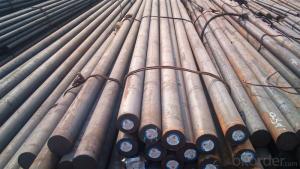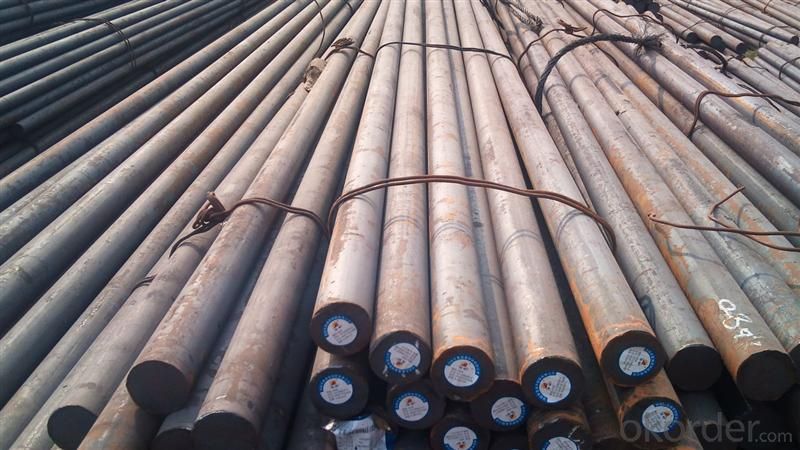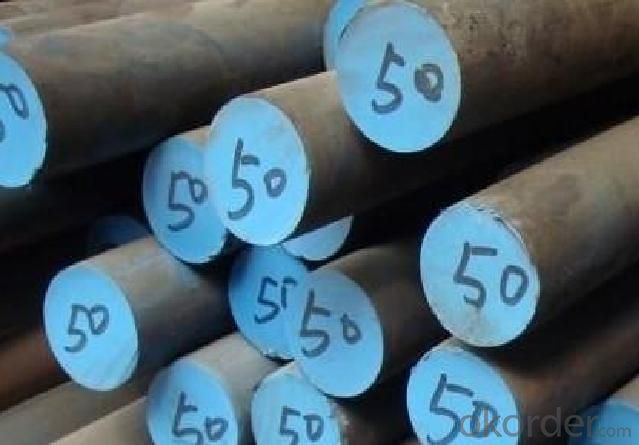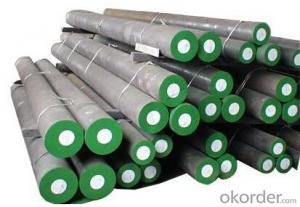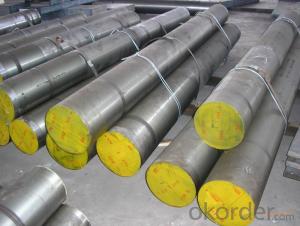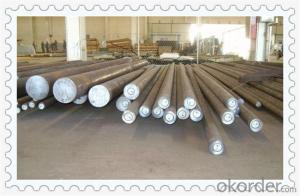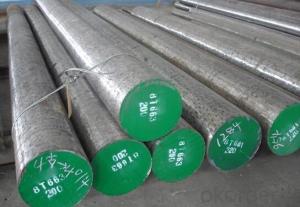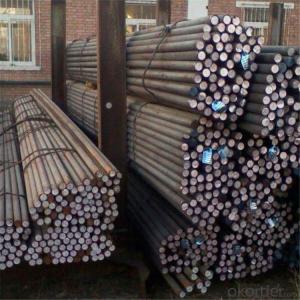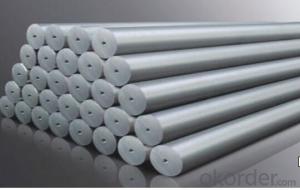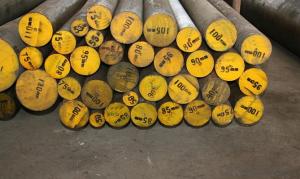ASTM 5140 Alloy Steel Bar Hot Rolled Finished
- Loading Port:
- Tianjin
- Payment Terms:
- TT OR LC
- Min Order Qty:
- 25 m.t.
- Supply Capability:
- 50000 m.t./month
OKorder Service Pledge
OKorder Financial Service
You Might Also Like
Specification
ASTM 5140 Alloy Steel Bar Hot Rolled Finished
Product Description:
Item | Alloy steel bar,alloy steel rod,steel bar,steel rod,alloy bar,alloy rod |
Standard | ASTM,AISI,SUS,GB,JIS,DIN |
Material | 10#,15#,20#,A105,1010,1015,1020,1030,S25C,S35V,1035,1050,1060,20Mn, 25Mn,30Mn,40Mn,50Mn,130,20Mn2,30Mn2,35Mn2,15Cr,15CrMo,42CrMo, 42CrMo4,34CrMo4,30CrMo,12CrMo,40Cr,35CrMo,C45,1045,4130,3140,4140, 4145,4137,5115,etc
|
Dimension | Round bar:Diameter:2-1000mm,Length:1-12m,or as required |
Flat bar:thickness:0.3-500mm,Width:2-3000mm,Length:1-12m,or as required | |
Square bar:Diameter:2*2-800*800mm,Length:1-12m | |
Angle bar:width:10*10-500*500mm,Thickness:2-150mm,Length:1-12m | |
Hexagonal bar:Diameter:4-800mm,Length:1-12m,or as required | |
Surface | polished,bright,black,coated,2b,ba,mirror,NO.4,8K |
Treatment | Hot rolled,cold drawn,Forged |
Package | Standard export seaworthy or as customers’ requirements |
Chemical Composition
Item | C | Si | Mn | P ≤ | S ≤ | Cr ≤ | Ni ≤ | Mo ≤ | Cu ≤ | |
GB/T 3077-1999 | 40Cr | 0.37-0.44 | 0.17-0.37 | 0.50-0.80 | 0.035 | 0.80-1.10 | 0.30 | 0.15 | 0.30 | |
Application:
Carbon steel rod applies to chemical industry,shipping industry,
manufacturing industry,construction,decorate industry,electric
power,pump shafts,sanitary wares,furniture handles,boiler,high
temperature resistant,low temperature resistant,corrosion resistant.
Product Show:
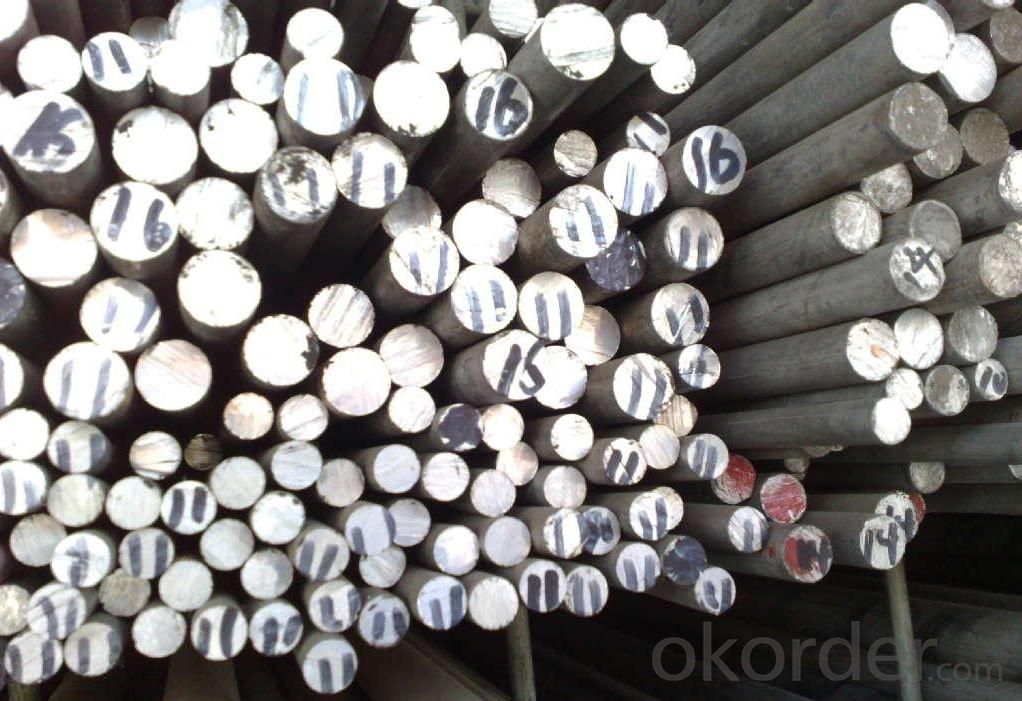
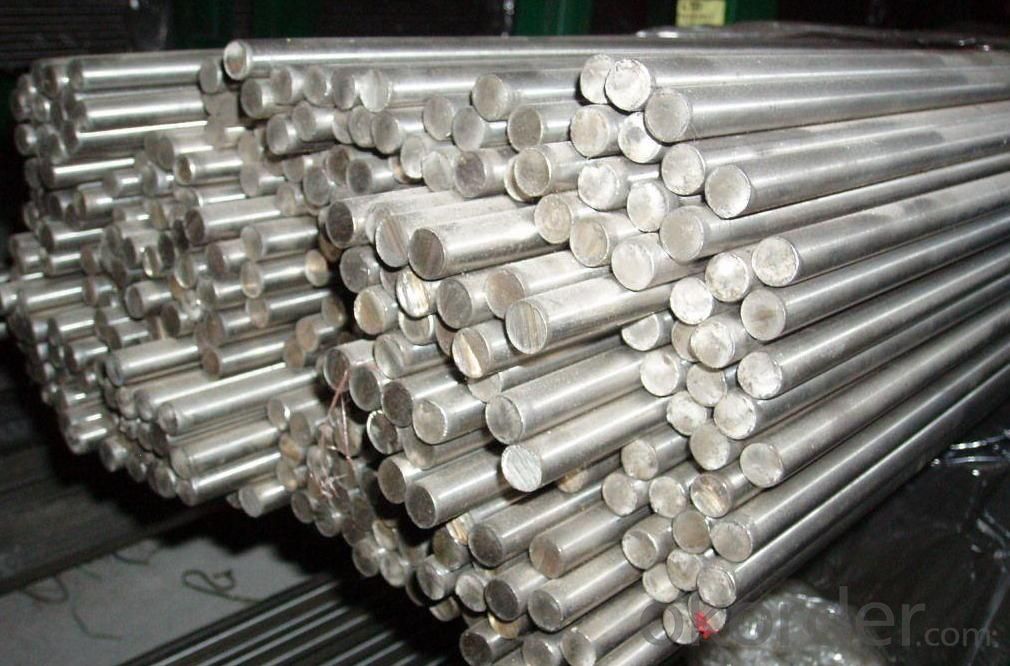
- Q: What are the properties of shock-resistant alloy steel?
- Shock-resistant alloy steel is known for its exceptional toughness and ability to withstand high impact and shock loads. It possesses a unique combination of strength, hardness, and ductility, making it ideal for applications in industries such as aerospace, automotive, and manufacturing. This type of steel undergoes specialized heat treatment processes to enhance its shock-resistance, thereby ensuring it can absorb and dissipate energy without fracturing or deforming. Additionally, shock-resistant alloy steel exhibits excellent corrosion resistance and can maintain its mechanical properties even in harsh environments, making it a reliable and durable material for various demanding applications.
- Q: What are the main factors affecting the corrosion resistance of special steel?
- The corrosion resistance of special steel can be influenced by several key factors. To begin with, the composition of the steel is pivotal in determining its ability to resist corrosion. Special steels often contain alloying elements like chromium, nickel, and molybdenum, which create a protective oxide layer on the steel's surface. This layer acts as a barrier, preventing corrosive substances from reaching the steel and causing damage. The higher the percentage of these alloying elements, the stronger the corrosion resistance of the steel. Another significant factor is the presence of impurities or contaminants in the steel. Impurities like sulfur or phosphorous can compromise the protective oxide layer, making the steel more vulnerable to corrosion. Therefore, it is crucial to ensure the purity of the steel and implement appropriate manufacturing processes to maintain good corrosion resistance. The surface finish of the steel also plays a role in its corrosion resistance. A smooth and polished surface minimizes the areas where corrosive substances can gather and penetrate the steel, thereby reducing the chances of corrosion. Surface treatments like passivation or coating can further enhance the corrosion resistance of special steel. Moreover, the environment in which the steel is exposed is a critical factor. Different environments contain varying levels of corrosive substances such as moisture, acids, or salts, which can accelerate the corrosion process. Marine environments, for example, with their high salt content, are particularly corrosive and demand special steel grades with superior resistance to such conditions. Finally, the operating temperature of the steel can impact its corrosion resistance. Certain special steels, like stainless steel, exhibit excellent resistance to corrosion at elevated temperatures, making them suitable for high-temperature applications where other materials may corrode. To summarize, the corrosion resistance of special steel is influenced by factors such as composition, impurities, surface finish, environment, and operating temperature. By considering these factors and selecting the appropriate steel grade, one can ensure optimal corrosion resistance for specific applications.
- Q: What are the applications of special steel in the nuclear industry?
- Special steel has various applications in the nuclear industry due to its unique properties. It is commonly used in the construction of nuclear reactors, fuel assemblies, and containment vessels. Special steel's high strength, corrosion resistance, and ability to withstand high temperatures make it ideal for these applications, ensuring the safety and efficiency of nuclear power plants.
- Q: What are the properties of magnetic stainless steel?
- Magnetic stainless steel is a type of stainless steel that exhibits magnetic properties due to its high iron content. It possesses good corrosion resistance, durability, and high strength, making it suitable for various applications. Additionally, it is easily formable and weldable, allowing for versatility in manufacturing processes.
- Q: What are the challenges in heat treatment of special steel alloys?
- The challenges in heat treatment of special steel alloys primarily revolve around achieving the desired mechanical properties while maintaining the material's chemical composition and microstructure. Special steel alloys often contain a complex combination of elements, making it crucial to carefully control the heating and cooling processes to prevent undesirable phase transformations or the formation of unwanted precipitates. Additionally, the high hardenability of some special steel alloys can lead to difficulties in achieving uniform hardness throughout the material. Achieving precise temperature control, as well as managing the time and cooling rates, becomes critical in order to avoid issues such as distortion, cracking, or reduced mechanical strength. Overall, the challenges in heat treating special steel alloys lie in finding the right balance between achieving the desired properties while avoiding any detrimental effects on the material's integrity.
- Q: How is special steel used in the telecommunications supply chain?
- Special steel is used in the telecommunications supply chain for various applications. It is commonly used in the manufacture of transmission towers, antenna masts, and other infrastructure components. The high strength and durability of special steel make it ideal for supporting heavy equipment and withstanding harsh environmental conditions. Additionally, special steel is also utilized in the production of fiber optic cables, providing protection and strength to ensure efficient data transmission. Overall, special steel plays a crucial role in ensuring the reliability and performance of telecommunications networks.
- Q: What are the main advantages of using special steel in the mining industry?
- The main advantages of using special steel in the mining industry are its exceptional strength, durability, and resistance to wear and tear. Special steel can withstand the harsh conditions and extreme forces encountered in mining operations, ensuring the longevity of equipment and machinery. Additionally, its high resistance to corrosion and heat makes it ideal for mining processes involving chemicals and high temperatures. Overall, the use of special steel enhances the efficiency, safety, and productivity of mining operations.
- Q: What are the requirements for special steel used in corrosive environments?
- Special steels used in corrosive environments are required to have specific properties to ensure their durability and performance in such conditions. The requirements for these steels can be summarized as follows: 1. Corrosion resistance: The primary requirement for special steels used in corrosive environments is excellent corrosion resistance. These steels should be able to withstand the attack of aggressive substances such as acids, alkalis, and salts. They should exhibit minimal or no signs of corrosion, ensuring the longevity of the steel and preventing any degradation in performance. 2. High strength: Special steels used in corrosive environments should possess high strength to handle the mechanical stresses imposed on them. This property is crucial for applications where the steel is subjected to heavy loads, pressures, or impacts. High strength also helps in maintaining the integrity and structural stability of the steel in corrosive conditions. 3. Resistance to pitting and crevice corrosion: Pitting and crevice corrosion are localized forms of corrosion that can occur in the presence of certain aggressive chemicals or stagnant environments. Special steels should have resistance to such forms of corrosion, as they can lead to localized damage, reduced structural integrity, and potential failure of the steel. 4. Stress corrosion cracking resistance: Stress corrosion cracking is a phenomenon that occurs when a combination of tensile stress and a corrosive environment compromises the material's integrity. Special steels should be resistant to stress corrosion cracking, ensuring their reliability under applied loads in corrosive environments. 5. Resistance to intergranular corrosion: Intergranular corrosion can occur along grain boundaries, leading to the weakening of the material. Special steels used in corrosive environments should have good resistance to intergranular corrosion, preventing any loss in structural integrity. 6. Thermal stability: Special steels should exhibit thermal stability to maintain their properties and resist degradation at elevated temperatures. This characteristic is essential for applications involving high-temperature corrosive environments. 7. Easy maintenance: Special steels used in corrosive environments should be relatively easy to maintain. This includes aspects such as ease of cleaning, resistance to fouling or scaling, and compatibility with cleaning agents or procedures commonly used in the industry. It is important to note that the specific requirements for special steels used in corrosive environments may vary depending on the application and the type of corrosive substances encountered. Therefore, it is crucial to carefully consider the particular needs and consult with experts in the field to select the most appropriate steel for each specific corrosive environment.
- Q: What are the different construction grades of special steel?
- There are several different construction grades of special steel, including but not limited to ASTM A36, ASTM A572, ASTM A514, and ASTM A588. These grades vary in their mechanical properties and are specifically designed to meet different construction requirements, such as strength, durability, or corrosion resistance.
- Q: What are the different methods of preventing stress corrosion cracking in special steel?
- To prevent stress corrosion cracking in special steel, various approaches can be implemented: 1. Optimal steel alloy selection is pivotal, as it enhances resistance to stress corrosion cracking. Alloys like stainless steel, duplex stainless steel, and nickel-based alloys are renowned for their effectiveness against this type of corrosion. 2. Implementing surface treatments such as passivation or electroplating forms a protective layer on the steel surface. This serves to prevent the penetration of corrosive substances and diminishes the likelihood of stress corrosion cracking. 3. Employing stress relieving through heat treatment methods aids in reducing residual stresses within the steel, which can contribute to stress corrosion cracking. This procedure involves heating the steel to a specific temperature and gradually cooling it, effectively minimizing residual stresses. 4. The use of corrosion inhibitors aids in safeguarding the steel from corrosive environments. These inhibitors can be introduced into the system or applied as a coating on the steel surface, creating a barrier that prevents corrosive substances from reaching the steel. 5. Environmental control plays a crucial role in stress corrosion cracking prevention. Monitoring and regulating factors such as temperature, humidity, and the presence of corrosive substances are essential in minimizing the risk. 6. Incorporating cathodic protection techniques can effectively prevent stress corrosion cracking. This involves applying sacrificial or impressed current to the steel, acting as a cathode and shielding the steel from corrosion. 7. Proper design considerations are paramount in preventing stress corrosion cracking. Factors such as avoiding sharp edges, minimizing stress concentrations, and ensuring adequate drainage to prevent the accumulation of corrosive substances significantly reduce the risk. By employing a combination of these methods, stress corrosion cracking in special steel can be effectively prevented, ensuring the longevity and integrity of the structure.
Send your message to us
ASTM 5140 Alloy Steel Bar Hot Rolled Finished
- Loading Port:
- Tianjin
- Payment Terms:
- TT OR LC
- Min Order Qty:
- 25 m.t.
- Supply Capability:
- 50000 m.t./month
OKorder Service Pledge
OKorder Financial Service
Similar products
Hot products
Hot Searches
Related keywords
